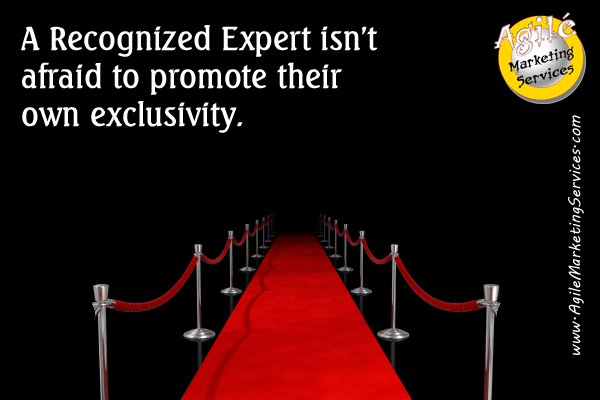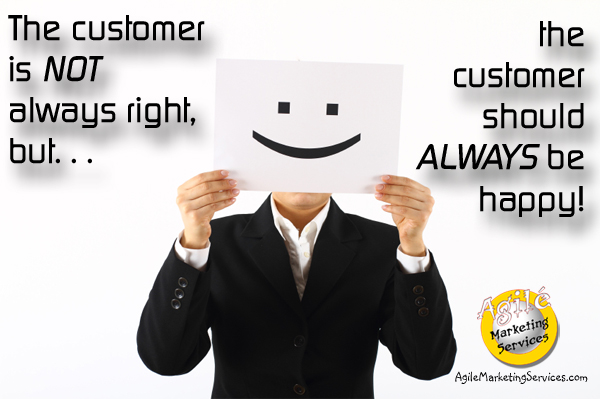
Sales
Kudos to AT&T
I recently changed cell phone services. I’d been with AT&T for years – since I got my first cell phone over 10 years ago. I’m loyal, but I’m not blind, so I went looking for better rates.
It turns out that Sprint could give me the exact same service that AT&T had been supplying, for just a hair over half of what I’d been paying. I’m not someone who buys strictly on price – I evaluate a lot of factors before making a significant purchase. So I called AT&T’s customer service department and asked for a lower rate. They wanted to know why I was considering switching.
“Sprint is going to charge me half of what you do for the same service.”
“I’m sorry to hear that. I hope our service has been satisfactory, and if there’s anything we can do to help with the transition please let us know.”
No begging me not to go, no attempt to lower their pricing to match what someone else was going to charge me. No offers of extra goodies to entice me to stay. While switching over to another carrier was going to be a pain (easier than I imagined, truth be told), I simply say this –
Learn from AT&T’s lesson, and don’t give in to the price shoppers! I recommend all my clients keep their prices higher than their competitors’. Why? So you can afford to give better service, and so that – should the occasion arise where you want to give low-cost or no-cost services – you can afford to do it without going out of business.
Price shoppers will always be out there, looking to snag a deal. You cannot remove them from the business environment, but you can remove them from your equation. They simply are not worth your time. Literally. You will never be able to stay in business if you cater to price shoppers. If you offer them a low-ball price, they’ll want a discount on top of that. If they find a lower price elsewhere, they’ll leave you and go there instead. I also find that people who insist on the lowest price also want the most personal service.
So, am I disappointed that AT&T didn’t try to bribe me into staying? Honestly, yes. On a personal level, you’d think they’d want me to stay. But they knew from past experience, and a serious attention to profit margins, that a half-price customer just isn’t worth it. From a business standpoint, I applaud them for knowing the kind of clients they want, and the price point that type of client is willing to pay. That’s their pool of prospects, and everyone else isn’t.
Bypass the cheapskates – sell to the right people at the right price.
Info member sites
For the last 5 days – well, nights actually – I’ve been working on putting together paid membership sites for a couple of the books I have coming out. I’ll be doing them as WordPress sites, so that each lesson can consist of blog posts and replies (questions, comments, requests for clarifications, etc.), plus the vids, PDFs or both that make up the lesson.
I’m also putting together the accompanying Facebook Pages for the sites (“Get the book for free when you sign up for the course!”), as well as the autoresponder e-mails (I use MailChimp). How come it seems like more work when I’m doing it for myself than when I’m doing it for a client?
Don’t worry – when the books & the courses are ready, I’ll offer them to my clients and readers at a significant discount.
What kind of on-line marketing are you doing?
Ratcheting up
I had a job in retail a long time ago, working at a now-defunct chain called Software Etc. Over the years, I’d run into some of the people I worked with. One guy, Steve, went on to start a couple of businesses. He was doing well enough that he’d hired a junior partner – slash – office manager, and a part-time phone sales person.
Steve and his manager decided that they were leaving a lot of money on the table, and wanted a way to scoop it back up. Just a cursory glance over their lack of process told me they could easily be making at least 3 times what they were currently pulling in, just by creating a sales process and following it.
In the few minutes that I was allowed to sit in the main office, I saw their “sales person” polishing her nails, reading a book, and brushing her hair. I was told she was there strictly to take orders and try to upsell, since she really wasn’t comfortable with making outbound calls. I didn’t hear the phone ring once in all the time I was at their offices.
My initial suggestions were met with outright hostility. Why would they make her do anything she didn’t want to? How dare I suggest that people who’d been filling out postage-paid interest cards actually get a phone call from her? If they took my suggestion and had her practice a follow-up process with current customers, didn’t I realize that would be taking time away from her phone duties? I delivered my recommendations and was shooed out. My follow-up calls and e-mails were never answered.
It was a case of, “I want the extra money, but I don’t want to change the way we’re doing things around here.”
I find I’m currently in the same situation. Do I want to make some major changes and shove a rocket up the tail of Agile’ Marketing? Or am I content with the way things are? Should I be forced at gunpoint to drink my own medicine?
Stick around – I have a feeling we’ll both be surprised by developments in the near future.
Customer service isn’t fair
I supply most of my clients with a copy of Zingerman’s Guide to Giving Great Service. Click on the Recommended Reading link and get yourself a copy. It’s thin, so take a couple hours and read the damned thing. Then go back, and read it again. You paid for it – write notes in the margin.
One of my favorite points raised: Customer service isn’t fair. We try to impose a “one size fits all” approach to handling sales and service, but more often than not if backfires on us. If life were fair, we wouldn’t need customer service. Products wouldn’t break during shipping, customers and vendors would be forgiving to a fault if the product or the check was late. Service would be perfect, and there would be no need for complaints or unhappiness.
The people in your organization responsible for customer service – this includes the Big Boss, and the front line people – should read the book. Better, go through the Zingerman’s customer service training. Not only will it save you money, but by practicing the techniques learned, you’ll make money and do more for your brand than almost anything else you can pay money for.
Expert advice
I was in Okinawa with a karate instructor last year for the Okinawa Karate Invitational Tournament. Our home (or honbu) dojo is in Okinawa City, and we were training with the head of our organization.
Over a marvelously cold and delicious Orion beer one night, he vented to me that he was ticked at the reaction by several of his American students. They were thrilled to receive personal corrections by the staff of the honbu dojo, and incorporated those corrections into their techniques immediately.
“These are exactly the same things I’ve been trying to get them to change. Do they listen to me? No! But when they hear it from some Okinawan guy they’ve never seen before, it’s like a commandment from heaven!”
I held my tongue, since I didn’t want it ripped out of my head. But he was exactly right – that’s what happened.
See, these people had paid thousands of dollars to travel half way ’round the world and mingle with instructors who mythically had karate-do bred into them. Sage advice from a guy they’d never seen before, speaking an incomprehensible language – they were primed to take this advice! They’d paid for it in cash, in time, in sweat. They made the modern equivalent of trek through unknown lands and up a forbidding mountain to hear wisdom from a wise man in a cave.
Familiarity breeds contempt. As true now as it always has been.
If you are hard to get hold of, if you make your followers go through hell, if you charge them an arm and both legs, if they have skin in the game, people will follow your advice.
Being recognized as an expert
Most entrepreneurs are experts at whatever they’ve chosen to do. I mean, why choose to be in a business you know nothing about? Even if you go in knowing nothing, after performing every task in your business from low to high, you become an expert by default.
But what’s a recognized expert, and how can being one help your business boom?
Well, think about it this way. How many times have you given free advice to friends, family and customers? How many times do they actually follow that advice? An expert doesn’t dole out the goodies – people seek them out, and pay a premium price for the wisdom that falls from their lips. Some even actually follow the advice after paying for it.
A recognized expert has things about them that let people know they’re an expert at what they’re doing. Experts write books, get interviewed in the media, and charge ridiculous prices for their products and services. Prospective clients find it hard to get hold of experts. Most importantly, a recognized expert is, well. . . recognized. Someone else says they’re an expert.
Advanced degrees, awards, and certificates from outside organizations are all good indicators that the person is a recognized expert. Books are still a sort of status symbol because the person seeing it can only imagine having the time to write their own book. And it’s still presumed (although usually not correctly these days, with self-publishing and vanity publishing houses enjoying a strong upswing) that the book made it through a long and arduous editing process, where it could have been killed at any moment.
In short, a recognized expert is surrounded by the trappings of being a recognized expert.
An expert can promote their expertise easier. They are sought out as someone outstanding in their field. Recognized experts can afford to charge very high prices, and turn away time wasters. They have time to put out mass-education products (books, seminars, etc.) and pick and choose their inner circle of high paying clients.
Most importantly, recognized experts no longer have to sell their products and services. By dint of their “celebrity” status, people line up to buy because they want to. They have been pre-sold by word-of-mouth from the expert’s fans, and by the expert’s appearances in editorial media.
This, in short, is what Agile’ does for it’s clients. Dispensing with the warm and fuzzy explanation, we are kingmakers. We put our clients in the position of being the go-to person in their industry or niche.



